One night in 2012, a man in a Ronald Reagan mask paused beneath a stop sign in the Old Fourth Ward. Armed with a stencil and a can of white spray paint, he transformed the sign into a tribute to a 1978 hit by a mostly forgotten Canadian pop crooner named Gino Vannelli: “I just wanna STOP & tell you what I feel about you, babe.”
“I Just Wanna Stop” is the kind of song whose words most Americans over 40 know despite never consciously choosing to listen to it. After peaking at no. 4 on the Billboard Hot 100 in 1978, the tune never quite disappeared, becoming the aural equivalent of a recurring wart. The song found a second life—an endless one, as it turns out—in the musical nether region where the smooth, soft-rock hits of yesteryear remain in heavy rotation. Yes, that’s “Africa” you’re hearing in the dentist’s office. And “What a Fool Believes” in line at CVS. And that faint melody burrowing into your brain while on hold for the next available customer service agent? That’s “Steal Away.” Songs like these, disparaged by critics in their time then jokingly christened “yacht rock” by a comedy web series in 2005, are now the soundtrack to American tedium.
They’ve also become the source of a very good—if conflicted—living for the man who defaced the stop sign: Nick Niespodziani, the singer, guitarist, and de facto leader of the wildly popular cover band Yacht Rock Revue, which tours the country, headlines 1,000-plus capacity venues, and occasionally even plays with the original artists behind these hits.
At the time of the Vannelli vandalism, Yacht Rock Revue had begun to graduate from a local curiosity to a national one. Niespodziani’s sister videotaped the incident and posted it on YouTube. They then printed T-shirts of the sign and, when Vannelli performed at the Variety Playhouse, they got one to him.
On a gray Monday afternoon not long ago, Niespodziani was standing at this crossroads, looking at the sign, trying to explain the motivation behind the prank. “We had this idea, so we videotaped,” he said. “It was definitely guerrilla marketing.” Also, he was pretty drunk.
The episode seems to capture something ineffable about Yacht Rock Revue—part fandom, part joke, part self-promotion, each element infused with irony. When YRR takes the stage at Venkman’s, an Old Fourth Ward restaurant and nightclub co-owned by Niespodziani and bandmate Pete Olson, the band is fully in character, complete with gaudy shirts and sunglasses. They crack jokes about each other’s moms and theatrically highlight multi-instrumentalist Dave Freeman’s one-note triangle solo during America’s “You Can Do Magic.”
“This music isn’t easy to perform,” Olson says. Yacht rock songs tend to be filled with complicated chord changes. All seven band members are accomplished musicians, and Niespodziani, who trained for a spell as an opera singer, is a rangy vocalist, capable of gliding through the high notes in Hall & Oates’s “Rich Girl,” Michael McDonald’s gruff tenor in “I Keep Forgetting,” and Dolly Parton’s amiable twang in “Islands in the Stream,” without seeming to strain. He, Olson, and drummer Mark Cobb first played together in Y-O-U, a band they formed at Indiana University in the late ’90s. They found scant support for original music there, so they relocated to Atlanta in 2002.
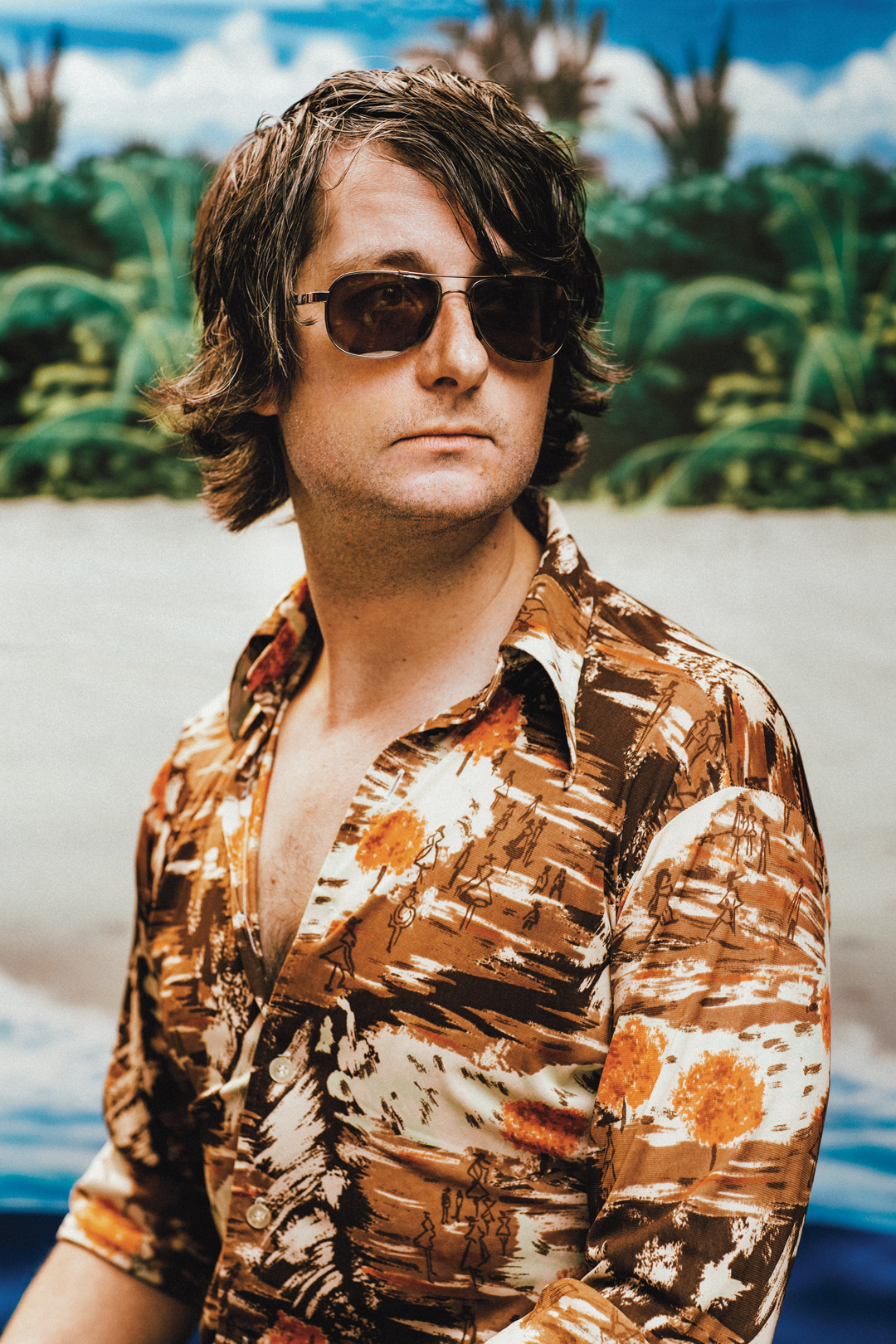
Photograph by Mike Colletta
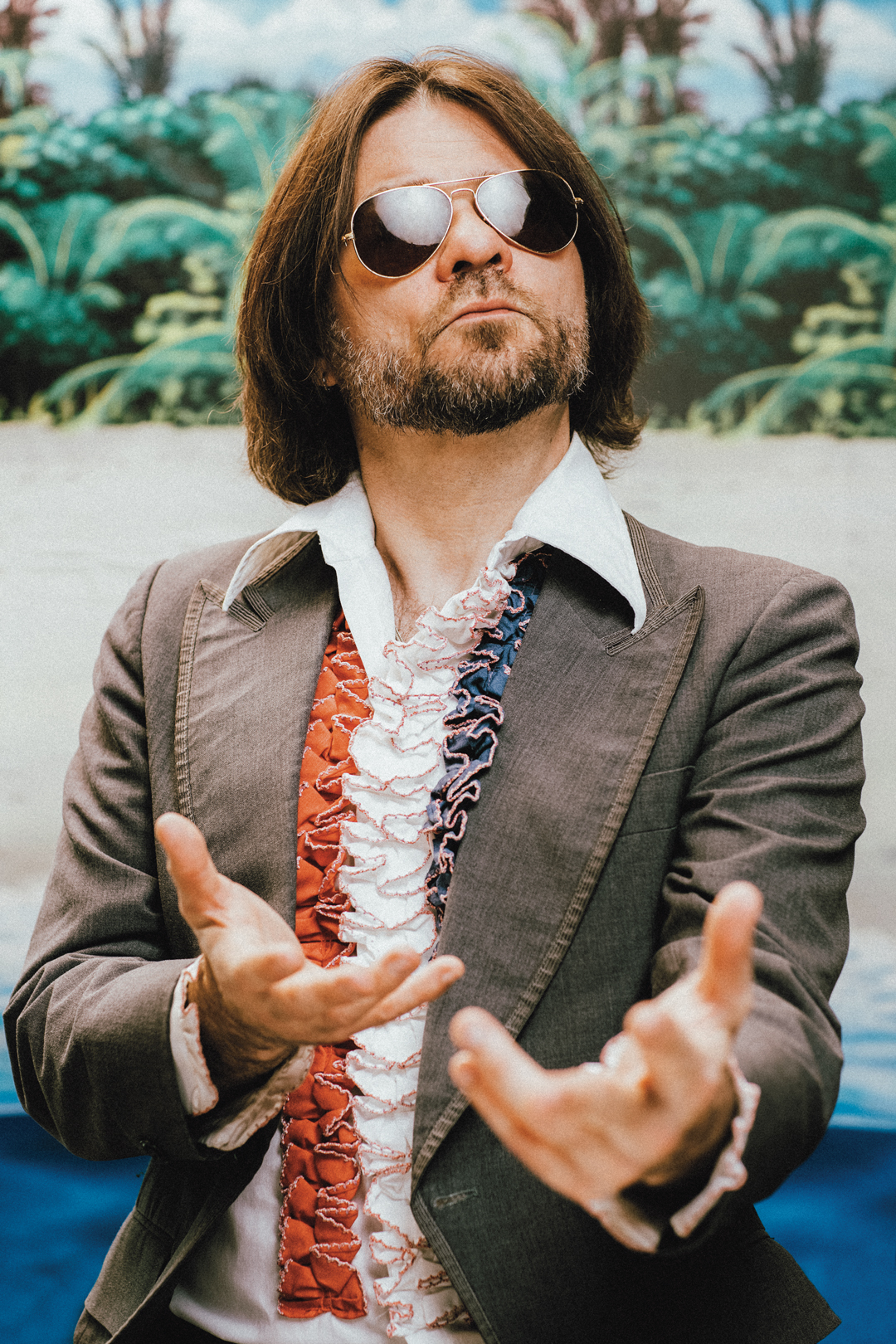
Photograph by Mike Colletta
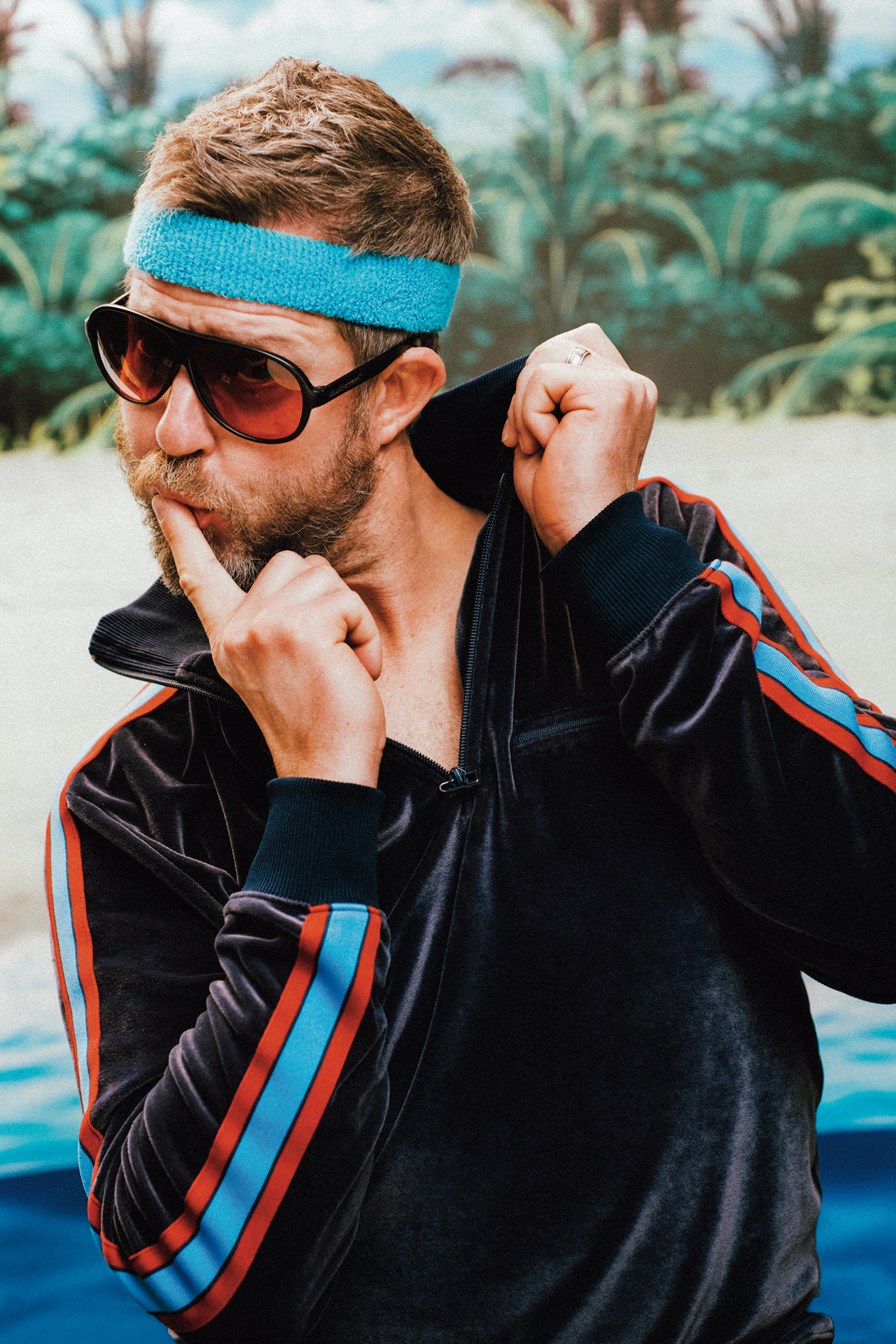
Photograph by Mike Colletta
Y-O-U built a buzz in Atlanta, thanks to Niespodziani’s catchy, Beatles-esque songs and the group’s playful gimmicks. They performed, straight-faced, as Three Dog Stevens, a sad-sack trio playing what they called “sandal-rock” (a made-up, synth-heavy genre defined by its purveyors’ predilection for wearing sandals with socks); they covered Michael Jackson’s “Thriller” entirely on keyboards while dressed as the Royal Tenenbaums; they created a YouTube mockumentary series about a competitive jump-roping team. “Comedy has always been part of what we do,” Niespodziani said. “We were doing anything to get noticed because we felt we had good songs but just couldn’t break through with them.”
“I said, ‘That sounds like hell on Earth.’ He was like, ‘But you’re going to make a lot of money.’ So we did it.”
In 2008, Y-O-U was booked every Thursday at the 10 High club in Virginia-Highland. They’d stage “Rock Fights,” playing dueling sets of covers by artists like Bob Seger, John Mellencamp, and INXS, or rejigger Y-O-U songs as soul rave-ups with horns and backing singers, or do a standup comedy night. Yacht Rock Revue was just another of these goofs: Put on silly clothes, and play songs everybody knows but nobody really likes—or claims not to. It was Cobb and guitarist Mark Dannells who came up with the idea. Dannells thought about calling it “A.M. Gold” but Cobb had recently seen a viral web series called Yacht Rock and felt like the term would resonate. Niespodziani went along because his friends needed his vocals. Two band members wore wigs to that first show, and, at one point, Niespodziani stripped off his shirt. People loved it. The club’s booker invited them back the next Thursday. The gig sold out. He asked them to do it every Thursday.
“I said, ‘That sounds like hell on Earth,’” Niespodziani recalls. “He was like, ‘But you’re going to make a lot of money.’ So we did it.”
Most cover bands are awful. But because they play well-known songs, they often secure regular, paying gigs that bands playing original music can’t. Even for the good ones, there’s a ceiling. Few ever perform further than 20 miles from wherever they played their first gig. What’s more, performing other people’s music for a living carries a degree of shame. Cobb has heard the mutterings about Yacht Rock Revue: “Why are these guys playing covers? They could write their own songs. They don’t need to hide behind a gimmick.”
Most of the guys in Yacht Rock Revue—which also includes bassist/vocalist Greg Lee and keyboardist/vocalist Mark Bencuya—had already spent half a lifetime dragging gear into dank basement bars to play for a few bucks and even fewer people. They did this in an era when the music business was cratering. The rise of the internet taught a generation of consumers that music is free, devaluing the dream to which musicians dedicate their lives.

Photograph by Mike Colletta
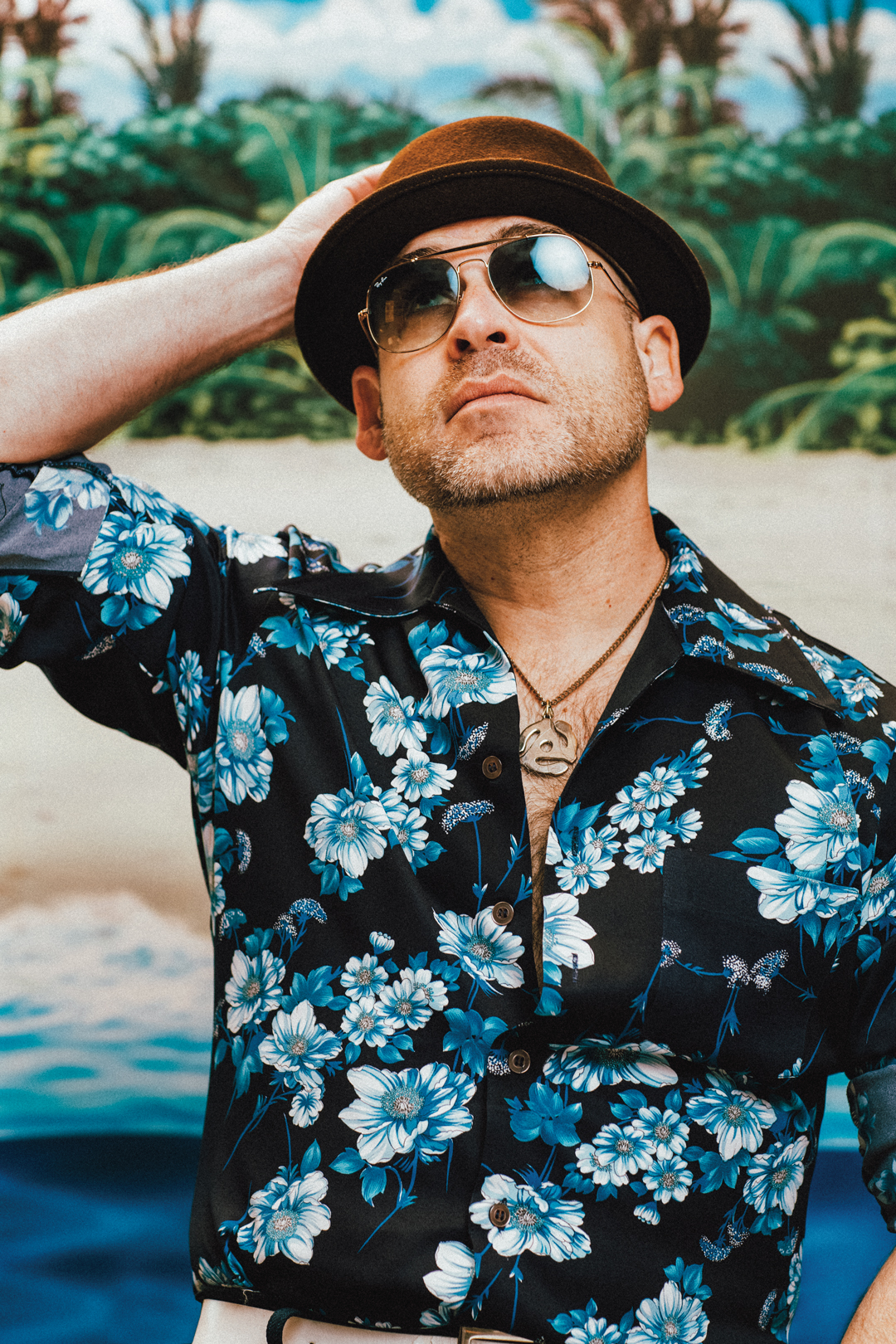
Photograph by Mike Colletta

Photograph by Mike Colletta
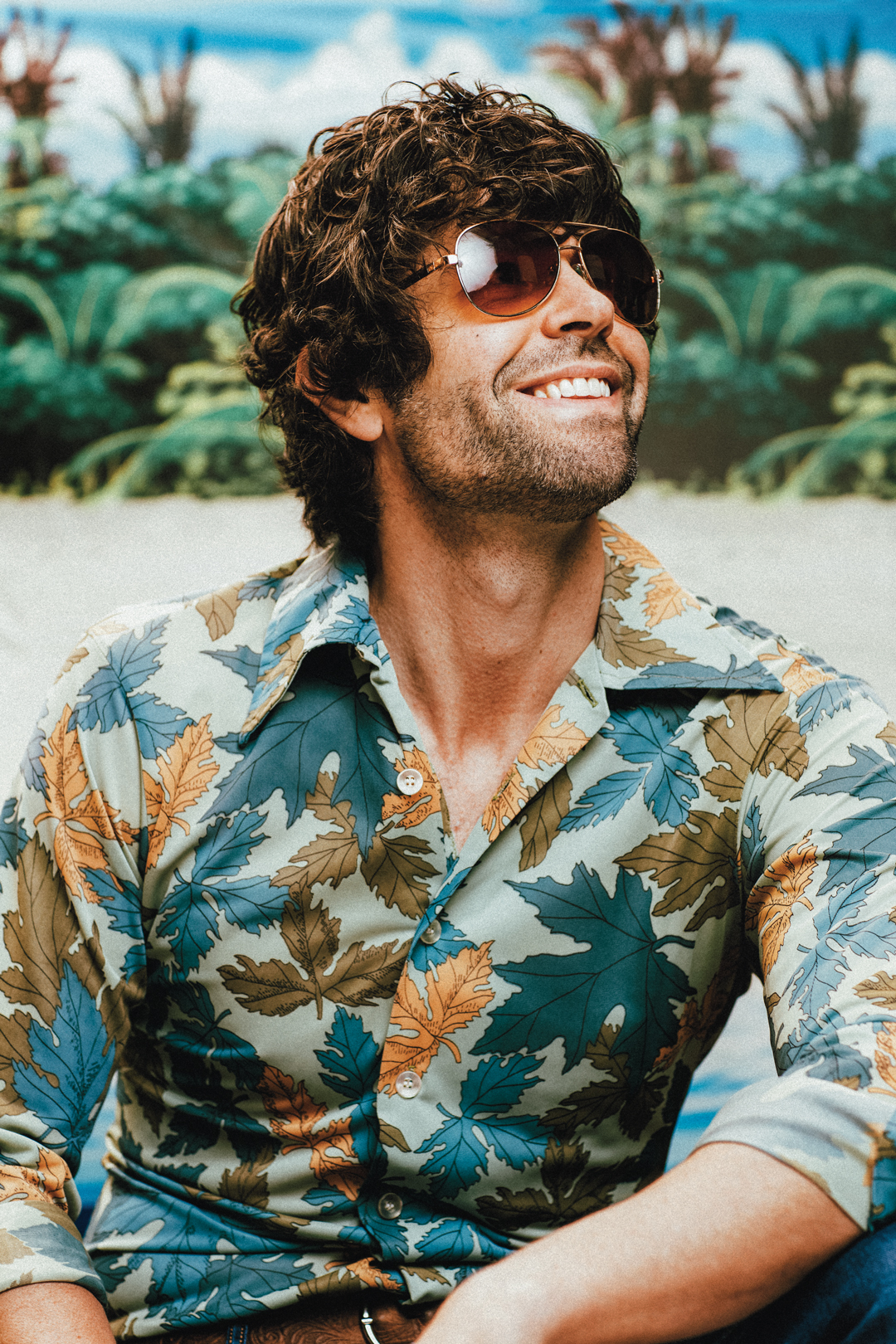
Photograph by Mike Colletta
When Yacht Rock Revue started in 2008, Dannells was nearly 40. “It’s not like the world is beating down the door of 40-year-old rock stars,” he says. Today, Yacht Rock is a business, owing its success partially to the corners of the business that haven’t collapsed: live music and merchandising. Besides their public shows, Yacht Rock Revue plays a steady stream of well-paying corporate gigs. They also sell lots of captain’s hats, T-shirts, and other swag. The success of the franchise means it’s been more than five years since any of them had a day job. Niespodziani and Olson created a company, Please Rock, that provides the bandmembers and their families with health insurance, 401Ks, and all the other trappings of comfortable, upper-middle-class stability few musicians ever achieve. All this grants bandmembers some real creative freedoms. “I just released a whole record of orchestral music,” Dannells says. “I don’t care if it sells. I just do it for enjoyment.”
Niespodziani shuttered Y-O-U years ago but still writes elegant power-pop songs for his other band, Indianapolis Jones. But the difference between his two bands’ profiles is stark. Troy Bieser, who has been working on a documentary about Yacht Rock Revue, says he’s seen this in the juxtaposition of the footage he’s compiled. “I’ve seen Nick going through the journey of being thankful for the success but it also feeling ill-fitting,” Bieser says. “That existential dilemma has followed him.”
Niespodziani knows whenever Yacht Rock plays anywhere, that’s a slot a band like Indianapolis Jones can’t get. “We’re a big part of the problem,” he says. As a 39-year-old father of one, who’s worked hard to get what he has, he isn’t about to give it up, but he’s also honest about the compromises he’s made and doesn’t hide from the question that is a natural byproduct of his own success: When a joke becomes your life, how do you keep your life from becoming a joke?
“I never would’ve guessed I’d be doing what I’m doing now,” he says. “The 23-year-old me would punch me in the face and leave me for dead.”
Yacht rock was mostly made in the late ’70s and early ’80s, but the genre wasn’t named until 2005 when JD Ryznar, a writer and actor, created the Yacht Rock web series with a few friends. The video shorts imagined the origins of songs like the Doobie Brothers’ “What a Fool Believes,” Toto’s “Rosanna,” and Steely Dan’s “FM.” The music, Ryznar says, was well-crafted, like a yacht, and recurring nautical imagery in songs like Christopher Cross’s “Sailing” or on Loggins and Messina’s album Full Sail made the term fit. According to Ryznar, true yacht rock has jazz and R&B influences, is usually produced in California, and frequently involves a rotating group of interconnected studio musicians. The term was never intended to be a pejorative—“we never thought it was silly music,” Ryznar says—but the web series is most definitely comedy, and feelings about the music itself tend to be buried under layers of hipster irony, warm nostalgia, and veiled contempt. Yacht rock songs are finely constructed: They’ve got indelible pop hooks, but they’re decidedly professional, not ragged and cool like punk or early hip-hop, which were canonized among the music of that era.
For the first Yacht Rock Revue gig, much of the set list came from a compilation CD that Cobb had burned titled The Dentist’s Office Mix. It included songs like Player’s “Baby Come Back,” Ambrosia’s “The Biggest Part of Me,” and Rupert Holmes’s “Escape (The Piña Colada Song).” “I’d put it on at parties and just see what the reactions would be,” Cobb says. “It was a weird, guilty pleasure.”
Niespodziani’s initial feelings about the music were uncomplicated. “I wasn’t a fan,” he says. “I was really into music that made people feel something, that had some grit and humanity to it. The ethos I thought was important in rock ’n’ roll was rebellious fun crossed with a heart-on-your-sleeve kind of thing. Yacht rock doesn’t do any of that. It doesn’t rebel.” He found a lot of yacht rock to be technical, clinical, and sterile. “Sophisticated for the sake of being sophisticated.”
Onstage, Niespodziani is the picture of unapproachable retro cool. Tall, with shaggy hair and an angular face, he hides behind large, dark sunglasses and frequently surrenders a thin half-smile. In other words, he personifies the classic, arrogant, coked-up, late-’70s rock frontman. In person, he gives off nearly the opposite impression. Over coffee, he’s thoughtful, earnest, and self-deprecating. His sharp facial features are accentuated by wide-lensed prescription glasses, and, having traded the polyester shirts he favors onstage for a camouflage green hoodie, the vibe Niespodziani exudes is hardcore music geek. Olson, who has known Niespodziani since they were in fourth grade in Columbus, Indiana, says when they met, “Nick was the nerdy kid who was good at math and jump-roping.”

Photograph by Emily Butler
Yacht Rock Revue, for Niespodziani, is a part he plays: “I’m almost more an actor than a musician.” He and his bandmates spend hours prowling vintage stores looking for the retro leisure wear that they don onstage—and then a not inconsiderable amount of money getting those old clothes tailored to fit. “It’s a war of attrition,” he says. “You find something that might work, and then it’s itchy or it smells or holes develop because the shirt is older than I am. You have to be shopping at all times.” They once did a gig in street clothes, but it felt wrong. “Polyester,” he says, “is our armor.”
Sometimes that armor hasn’t been enough for Niespodziani. During the band’s first few years, they played weekly at the 10 High. “I would drink a lot and almost sabotage myself, sometimes onstage, and make fun of it,” he says. “People would ask me about the band, and I’d talk down about it and act like I was too cool. I didn’t lash out at people, but it was strange to get well-known for something that didn’t make me feel good about myself. I’d get drunk onstage to deal with it.”
His bandmates certainly noticed, but, for the most part, they let their friend work through it. “He’s been the moodiest about it,” Cobb says. “He just hates Rupert Holmes’s ‘Escape (The Piña Colada Song).’ Hates it. But he knows it goes over well.” So when Niespodziani’s got to play it, he’ll often deadpan an introduction comparing Holmes to da Vinci and Picasso. “By talking about how great it is, it helps me shed that song’s terribleness.”
Niespodziani believes the ironic distance he puts between the guy he is onstage and the guy drinking coffee at Ponce City Market is fundamental to the band’s success. “Because we thought—or at least I thought—I was too cool to be doing this, everything has keyed off what the audience reacts to, whether it’s the clothes we wear, the sidestep dance we do, whatever. The audience has been the head of the snake. We’ve just been following it.” It helps that with more than 500 songs in their repertoire, the band doesn’t burn out too badly on any tune. “The only song we have to play is ‘Africa.’” The 1982 hit by Toto, by a band made up of talented but largely anonymous studio musicians, has become something of an Internet meme itself, with multiple think pieces devoted to untangling its allure. “Part of it may be the audacity of the synthesizer sound,” Niespodziani says. “They’re just so cheesy. The chords are fairly complex and pretty unexpected. The way it goes to the minor key in the chorus is kind of a cognitive disconnect. And when you listen to the words, it’s not really about anything. Maybe that’s why it’s so quintessentially yacht rock. It’s not so much what the words are saying, it’s how they make you feel, this combination of pure joy crossed with reminiscing.”
Despite his ambivalence about the music, Niespodziani is first among equals within the band. He sings lead on more songs than anyone else, and it’s his judgment they trust when adding songs to their catalog. He has a system: “Generally, the more a song annoys me, the more likely it makes sorority girls want to eat each other’s brains. Also, almost every song would be an encore for the band we’re covering. So, those are the basics: Does it annoy me? Are girls going to like it? Would it be an encore for the band we’re covering?”
“I’m almost more an actor than a musician.”
Others in the band are more unabashed about the music. “I’ve always loved all this stuff,” says Lee, the bassist. “You have to love it before you can play with it in that comedy sense and do it right.” This ability to walk that line between having fun with the music and making fun of the music has won over many of the original artists. When the band first reached out to guys like Dupree, Gary Wright (“Dream Weaver”), and Player’s Peter Beckett, some artists disdained the term “yacht rock” and feared being treated as a joke. Dupree was an early convert and evangelized about the band to his peers, touting their musicianship and enthusiasm. He says those who eventually performed with Yacht Rock Revue were “staggered that they were playing in front of 4,000 people who knew every word to their songs.”
The genre’s rise as a cultural touchstone—Jimmy Fallon has been a big booster, inviting Dupree, Cross, McDonald, and others to perform on TV, and there’s now a SiriusXM station devoted to it—has benefited these artists. Their Spotify and YouTube streaming numbers have risen noticeably. “It’s made a big impact financially,” Dupree says. “Even the skeptics have seen the power of it.”
For a while, the band had a bit of a good-natured Twitter beef with the creators of the Yacht Rock web series. Ryznar admits he initially felt like the band had hijacked his idea, but now his only real gripe is Yacht Rock Revue’s liberal definition of yacht rock. “Half their set is incredible yacht rock,” Ryznar says. “The other half, they play way too much Eagles, America, and Fleetwood Mac. Those aren’t yacht rock bands.”
The band makes no apologies. As Niespodziani puts it, “Yacht rock is what we say it is now.” That’s not just bravado. Yacht Rock Revue trademarked the term “yacht rock” for live performances, so other acts can’t use it without permission. The maneuver helped snuff out competition from other cover bands but occasionally puts them in conflict with some of the genre’s originators. When Cross’s manager tried to assemble a “Yacht Rock” tour featuring Cross, Orleans, and Firefall, it ran afoul of the trademark.
“We said, ‘If you want to call it Yacht Rock, we’ve got to be the [backing] band,’” Olson says. That compromise collapsed when Cross’s manager “wanted a piece of the trademark and of all our earnings over three years.” Yacht Rock Revue sent a cease-and-desist letter instead.
The band’s set list is anchored in the classic late ’70s, early ’80s yacht-rock era but can stretch to include songs as old as the late ’60s or as recent as the early ’90s. Of course, there’s a balance to be struck: If they go too far afield, they risk becoming just another cover band, but there are other considerations to take into account, too. As Cobb explains, “Nothing about Whitney Houston is in the genre, but when we play ‘I Wanna Dance with Somebody,’ the chicks go crazy, everybody orders another round, the bar sells out of Tito’s and Red Bull, and they’re like, ‘When can you come back? You broke alcohol records.’”
The band’s audiences have evolved over time. The earliest shows were heavy on hipsters and fellow musicians. Then, those fans brought their parents. At a Buckhead Theatre gig in March, the crowd leaned toward balding guys in button-down shirts and platinum-blond women wearing expensive-looking jewelry. Niespodziani once called yacht rock “the music of the overprivileged,” which was a joke, but also not. Getting older, wealthier fans out to shows is an impressive accomplishment most artists would envy, but it has changed something fundamental about Yacht Rock’s appeal. “When we started, it was people elbowing each other, laughing at this music,” Niespodziani says. “Now, there’s no irony.”

Photograph by Mike Colletta
On a night off during a Vegas stand in 2015, the entire band went to see Ringo Starr and his All-Starr Band perform at the Pearl Theater in the Palms Casino. Starr began doing these tours in 1989, fronting a band of aging rockers like Gary Wright, Steve Lukather (Toto), and Gregg Rolie (Santana, Journey), whose names and faces you might not recognize but whose songs you certainly would. Just past the midway point in the show at the Pearl, Lukather stepped to the mic, and Starr began beating out a familiar rhythm on the drums. As Lukather picked out the first few notes on the guitar and the synths pumped out the insistent melody, the song was instantly recognizable: “Africa.” In the theater balcony, Cobb recalls looking across at Niespodziani and seeing something change in his friend. “I just watched Nick’s face and, all of a sudden, it was as if this weight lifted off him.”
The Beatles had always been Niespodziani’s favorite band. “Now, I’m watching Ringo Starr, and he has to play fucking ‘Africa’ every night, too,” Niespodziani says. “He was in the Beatles! That was a life-changing moment for me.” Starr and his band were touching many of the same nerves in the audience at the Pearl Theater that Yacht Rock Revue touches all the time. “When we started Yacht Rock, I didn’t like the music we were playing. I didn’t like myself for being in a cover band. I had some dark times. It’s been a journey for me to get okay with it. That was a pretty key moment. Once you get to a certain point in the music business, everybody’s hustling. I’m not going to look down my nose at anybody for doing anything that makes it possible to feed their family by singing songs.”
Seeing Starr go yacht rock was a significant step that’s made enjoying Yacht Rock Revue’s triumphs a little easier. For years, Olson and Niespodziani waited for interest in yacht rock—and their band—to fade. Opening Venkman’s was a hedge against that. But Yacht Rock Revue’s stock continues to rise. Their touring business has grown 375 percent since 2014. “It’s not a fad,” Niespodziani says. “This is going to be our biggest year by far.” They play increasingly larger venues and have recently started booking dates overseas, including this summer in London.
The question is, where else can they take this, literally and figuratively? Back in 2013, the band quietly released a five-song EP: four original songs and a cover of—what else?—“Africa.” They used to occasionally drop an original tune into their shows, sometimes announcing it as a “Hall & Oates B-side.” The crowds were amenable, kind of. “It’s hard when they know every word to every song,” Niespodziani says. “They don’t come for discovery; they come for familiarity.” That’s a truism any band who has ever had a hit knows all too well. The essential appeal of Yacht Rock Revue—and yacht rock—is a combination of nostalgia and escape, a yearning for the simpler, easier time these songs evoke. Yet Niespodziani has been wondering lately if it’s possible to pivot fans to his own songs, either with Yacht Rock Revue or Indianapolis Jones.
“That’s still my dream,” he says, “to have one song that matters to somebody the way ‘Steal Away’ matters to people. No matter what else I do in life, if I don’t ever get over that bar, part of me will feel like I failed at the one thing I wanted. I don’t know if I can ever let go of that. I don’t know if I’m ready to face that darkness.”
In 2013, during a commencement speech at Syracuse University, the author George Saunders told graduates, “Success is like a mountain that keeps growing as you hike up it.” Niespodziani brought this quote up to me while we were having coffee. He knows his life is nothing to complain about. He lives a rarefied existence where he gets paid a lot of money to play music. But clearly, the mountain grows in front of him, and the hike up isn’t always easy. He’s still prone to self-deprecating asides about his band, he still kinda envies the Robbie Duprees of the world—but, hey, he doesn’t need to get drunk onstage anymore, and he doesn’t lose sleep wondering if he’s a force for good or evil in the world. That stop sign at the crossroads in the Old Fourth Ward isn’t an omen or a cautionary tale. It’s simply a funny story that makes people smile. He’s just working on becoming one of them.
“The way I really made peace with it is, it occurred to me that everywhere we went, everyone was so happy to see me,” he says. “These people, it’s the highlight of their week to come sing along with these tunes. If your job is making people happy, that’s a pretty good calling.” He leans back in his chair and smiles. “My job is to make it okay for everybody else to have fun. That’s kind of cool.” He gets quiet for a moment and shrugs.
“I guess.”
This article appears in our July 2018 issue.












